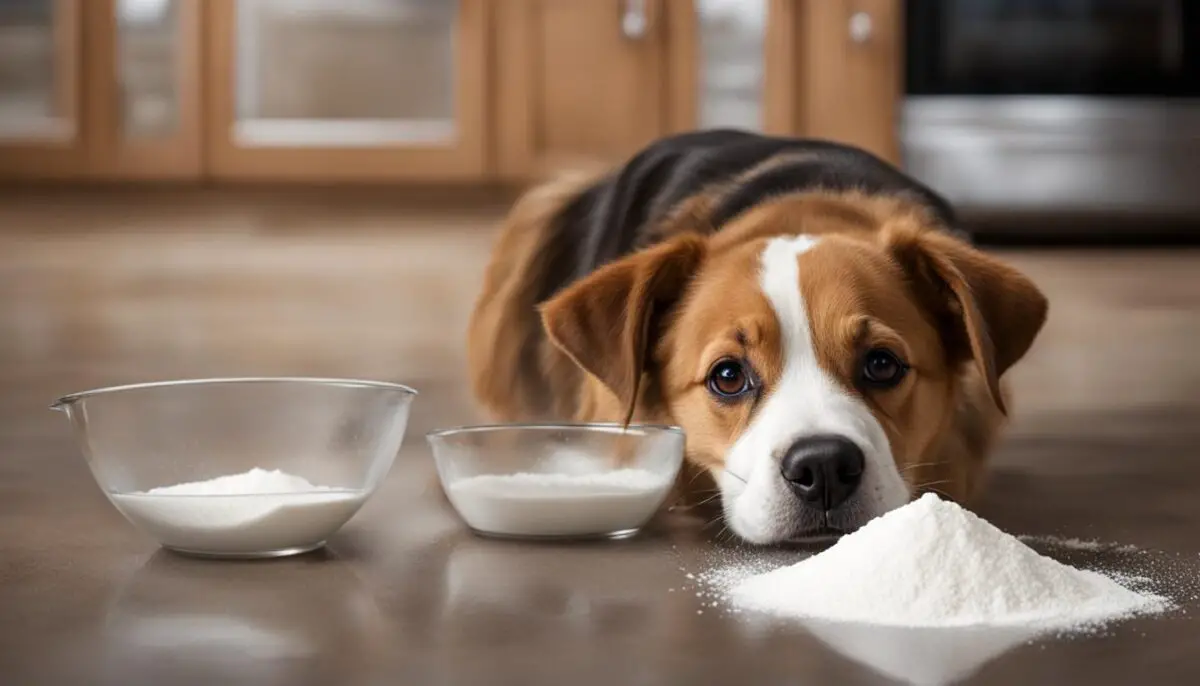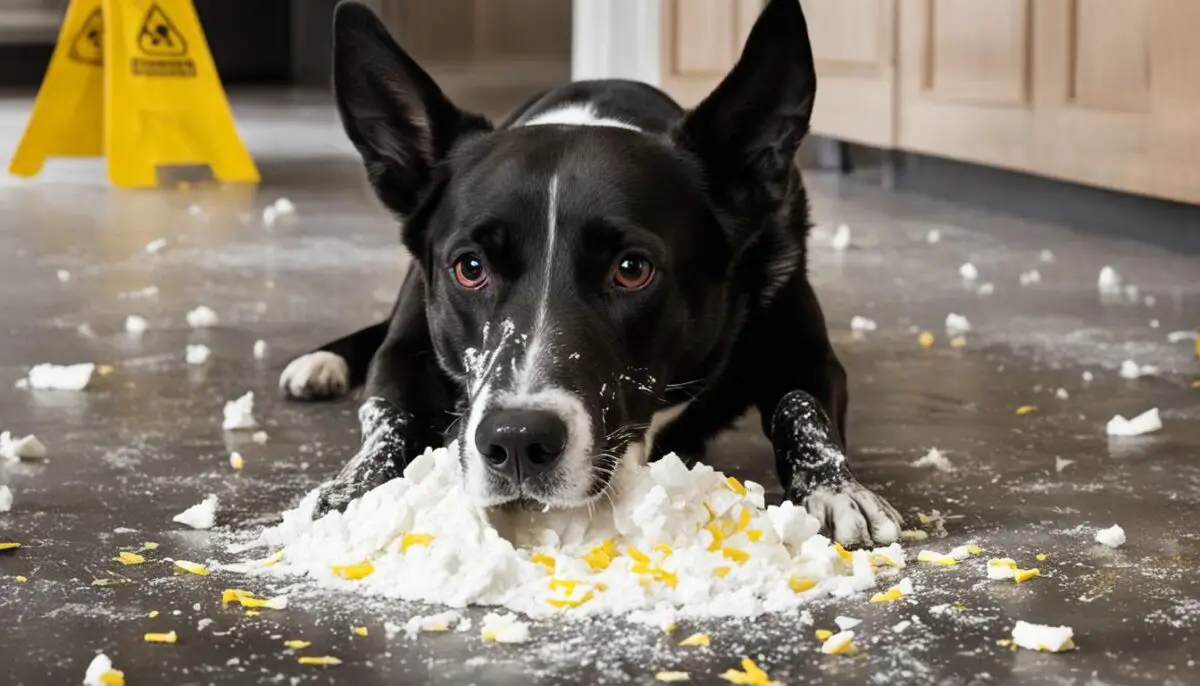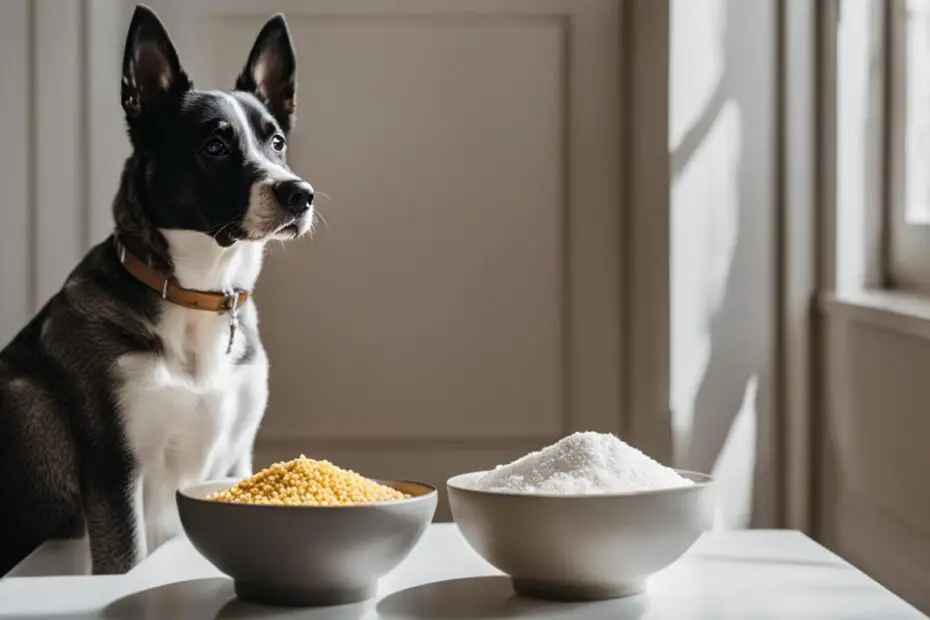If you’re a dog owner, you may have wondered whether cornstarch is safe for your furry friend. It’s not uncommon to find cornstarch in various human snacks and food products, but is it suitable for dogs? In this article, we will delve into the topic of cornstarch for dogs, examining its safety and exploring the potential risks and benefits associated with its consumption.
Before we proceed, it’s crucial to note that consulting with your veterinarian is essential before introducing any new food or treats to your dog’s diet. They can provide expert guidance based on your dog’s specific needs and health condition.
Key Takeaways:
- While cornstarch is generally safe for dogs, moderation is key.
- Feeding dogs plain cornstarch or allowing them to consume large quantities of cornstarch-containing food can lead to digestive issues and weight gain.
- A balanced diet should include protein, vitamins, fiber, and healthy fats, not relying heavily on cornstarch.
- For dogs with corn allergies or sensitivities, alternative options like oat flour, rice, potato starch, or tapioca starch can be used as substitutes in homemade dog treats and recipes.
- Cornstarch can serve as an energy source and is gluten-free, making it suitable for dogs with gluten sensitivities. It can also be used topically for dry shampooing or to treat skin rashes in dogs.
What Is Cornstarch?
In this section, we will delve into what exactly cornstarch is and its role in various recipes.
Cornstarch is a fine powder that is extracted from the endosperm of corn kernels. It is commonly used as a thickening agent in cooking and baking due to its ability to absorb and retain moisture. Cornstarch has a neutral taste and is often preferred over other thickeners like flour or arrowroot for its smooth texture and translucent appearance when cooked.
When added to soups, sauces, and gravies, cornstarch helps create a thick and glossy consistency. It can also be used in desserts such as custards and puddings to give them a creamy texture.
“Cornstarch is a versatile ingredient that can be found in many pantry staples and recipes. Its ability to thicken and provide a smooth texture makes it a popular choice in both savory and sweet dishes.”
Cornstarch is also commonly found in dog biscuits and pet foods. It serves as a binding agent and provides structure to the treats. Furthermore, cornstarch is often used in gluten-free recipes as a substitute for wheat flour, making it a suitable option for dogs with dietary restrictions or sensitivities.
Now that we have a better understanding of cornstarch, let’s explore whether it is safe for dogs to consume and the potential risks and benefits associated with its inclusion in their diet.

Feeding your dog excessive amounts of cornstarch can lead to weight gain, digestive issues, and potentially contribute to the development of obesity or related health conditions. Dogs have different nutritional requirements than humans, and their digestive systems may not handle large quantities of cornstarch-filled foods as efficiently. Monitoring portion sizes and choosing a balanced, dog-specific diet will help maintain your pet’s overall health and well-being.
Before introducing any new food or treats into your dog’s diet, it’s always a good idea to consult with your veterinarian. They can evaluate your dog’s specific health needs and provide guidance on the appropriate amount of cornstarch or any other ingredients that can be safely incorporated into their diet. Your veterinarian’s advice will ensure that your dog’s nutritional needs are met and any potential health risks are mitigated.
Risks of Cornstarch for Dogs
While cornstarch is generally safe for dogs to eat, it’s important to be aware of the potential risks associated with its consumption. Feeding dogs plain cornstarch or allowing them to consume large quantities of food containing cornstarch can have negative effects on their health.
Digestive Issues
Feeding dogs plain cornstarch or giving them excessive amounts of food containing cornstarch can lead to digestive problems. Cornstarch is high in carbohydrates, and when consumed in large quantities, it can be challenging for dogs to digest properly. This can result in bloating, gas, diarrhea, and discomfort.
Weight Gain and Obesity
Cornstarch is a source of energy due to its high carbohydrate content. When dogs consume too much food containing cornstarch, they can easily exceed their caloric needs, leading to weight gain and obesity. Dogs that are overweight or obese are at a higher risk of developing various health problems, including diabetes, heart disease, and joint issues.
Monitoring and Balanced Diet
It’s important to monitor your dog’s intake of food or treats that contain cornstarch. While small amounts of cornstarch are generally safe, it’s crucial to provide your dog with a balanced diet that meets their nutritional needs. Incorporate protein, vitamins, fiber, and healthy fats into their meals to ensure their overall health and well-being.
Consult with your veterinarian for specific dietary recommendations that are tailored to your dog’s individual needs. They can provide guidance on portion sizes, suitable treats, and any specific dietary restrictions based on your dog’s age, weight, and overall health condition.
By being mindful of your dog’s cornstarch consumption and maintaining a balanced diet, you can help minimize the potential risks and contribute to their overall health and well-being.
| Common Risks of Cornstarch for Dogs: | Prevention and Management: |
|---|---|
| Digestive issues (bloating, gas, diarrhea) | Monitor cornstarch intake and ensure moderation |
| Weight gain and obesity | Provide a balanced diet and control portion sizes |
| Consult with a veterinarian for dietary recommendations |
Remember, while cornstarch is generally safe for dogs, it’s important to be cautious about its consumption to avoid potential health issues. Prioritize a balanced diet and consult with your veterinarian for personalized guidance.

Cornstarch Alternatives for Dogs
If your dog has a corn allergy or you prefer to avoid feeding them cornstarch, there are alternative options available. You can use oat flour, rice, potato starch, and tapioca starch as substitutes for cornstarch in homemade dog treats and recipes. These alternatives work well for dogs with gluten sensitivities or allergies to corn.
Here is a list of cornstarch alternatives for dogs:
- Oat flour: Made from ground oats, oat flour is a nutritious option that adds a mild, nutty flavor to dog treats.
- Rice: Rice flour, made from ground rice grains, is a gluten-free alternative that is easy to digest.
- Potato starch: Derived from potatoes, potato starch is a versatile ingredient that adds texture and thickness to recipes.
- Tapioca starch: Extracted from the cassava root, tapioca starch is a great cornstarch substitute that helps create light and fluffy baked goods.
These alternatives can be used in a 1:1 ratio to replace cornstarch in your dog’s favorite recipes. Remember to introduce any new ingredient gradually to ensure your dog’s digestive system adapts well.
If you’re unsure about which alternative to use or how much to use, consult with your veterinarian for tailored advice based on your dog’s specific dietary needs.

Why Choose Cornstarch Alternatives?
Using cornstarch alternatives for your dog’s treats and meals offers several benefits:
- Food sensitivities: Dogs with corn allergies or gluten sensitivities can still enjoy delicious homemade treats without any discomfort.
- Improved digestion: Some dogs may have difficulty digesting cornstarch, and opting for alternatives can help prevent digestive issues.
- Varied flavors and textures: By incorporating different alternatives, you can introduce new flavors and textures to keep your dog’s meals interesting.
- Health-conscious choices: Cornstarch alternatives can provide added nutrients and diversify your dog’s diet, contributing to overall health and wellbeing.
Remember to monitor your dog for any adverse reactions or allergies when introducing new ingredients, and always prioritize their nutritional needs when selecting alternative options.
Benefits of Cornstarch in Dog Food and Treats
While cornstarch may not have significant nutritional benefits for dogs, it can serve as a safe and affordable ingredient in dog food and treats. Let’s explore some of the benefits of incorporating cornstarch into your furry friend’s diet:
- Easily Digestible: Cornstarch is gentle on your dog’s digestive system and can be easily broken down, making it a suitable option for dogs with sensitive stomachs.
- Source of Energy: With its carbohydrate content, cornstarch provides a source of energy for your dog, helping them maintain an active and healthy lifestyle.
- Gluten-Free Option: Cornstarch is naturally gluten-free, making it ideal for dogs with gluten sensitivities or allergies.
In addition to being used as a dietary ingredient, cornstarch can also have topical benefits for dogs. It can be an effective dry shampoo alternative, helping to absorb excess oils and keep your dog’s coat fresh between baths. Furthermore, cornstarch can be used to treat skin rashes in dogs, providing relief and soothing irritated skin.
Here’s how you can utilize cornstarch to make a dry shampoo for your dog:
DIY Cornstarch Dry Shampoo
- Mix equal parts of cornstarch and baking soda in a bowl.
- Apply the mixture to your dog’s coat, focusing on areas that tend to get greasy or have odors.
- Gently rub the mixture into your dog’s fur, ensuring it reaches the skin.
- Leave it on for a few minutes, then brush through your dog’s coat to remove any excess powder.
Remember, it’s essential to introduce cornstarch or any new ingredient gradually into your dog’s diet. If you have any concerns or questions, consult with your veterinarian for personalized advice.
| Benefits of Cornstarch in Dog Food and Treats | Description |
|---|---|
| Easily Digestible | Cornstarch is gentle on the digestive system, making it suitable for dogs with sensitive stomachs. |
| Source of Energy | Cornstarch provides dogs with a source of energy due to its carbohydrate content, supporting their active lifestyle. |
| Gluten-Free Option | Cornstarch is gluten-free, making it a suitable alternative for dogs with gluten sensitivities or allergies. |
| Topical Benefits | Cornstarch can be used as a dry shampoo to absorb excess oils and treat skin rashes in dogs. |
Conclusion
In conclusion, cornstarch can be safely consumed by dogs in moderation. It’s important to understand the potential risks and benefits associated with feeding your dog cornstarch and to consider their individual needs and health conditions.
If you’re thinking about introducing cornstarch or any new food to your dog’s diet, it’s always best to consult with your veterinarian first. They can provide personalized advice based on your dog’s specific requirements and make sure that the food is suitable for their overall health.
Remember to monitor your dog’s intake of cornstarch and any other treats or food products to ensure they maintain a balanced diet. If you notice any unusual symptoms or have concerns about your dog’s health after they have consumed cornstarch, it’s essential to seek veterinary advice promptly.
Ultimately, while cornstarch can be a safe and affordable ingredient for dogs, it’s crucial to prioritize their overall well-being and nutrition by providing a diverse and balanced diet that meets their specific needs.
FAQ
Can dogs have cornstarch?
Yes, dogs can have cornstarch in moderation. Small amounts of food made with cornstarch, such as homemade dog treats, are generally safe for dogs to consume.
What is cornstarch?
Cornstarch is a fine powder that is extracted from the endosperm of corn kernels. It is commonly used as a thickening agent in various recipes and can be found in many dog biscuits and pet foods.
Are there risks associated with feeding dogs cornstarch?
Feeding dogs plain cornstarch or allowing them to eat large quantities of food containing cornstarch can lead to digestive issues and weight gain. Dogs that consume high amounts of sugar or carbohydrates are at a higher risk of developing obesity, diabetes, and heart disease.
What are some alternatives to cornstarch for dogs?
Oat flour, rice, potato starch, and tapioca starch can be used as substitutes for cornstarch in homemade dog treats and recipes. These alternatives are suitable for dogs with gluten sensitivities or allergies to corn.
Are there any benefits of cornstarch for dogs?
While cornstarch may not have significant nutritional benefits for dogs, it can serve as a safe and affordable ingredient in dog food and treats. It is a source of energy due to its carbohydrate content and can be easily included in homemade recipes. Cornstarch is also gluten-free, making it a suitable option for dogs with gluten sensitivities.

